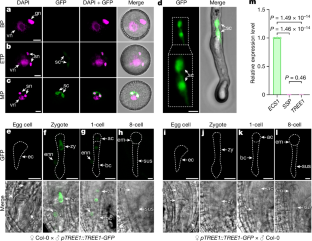Sperm-origin paternal effects on root stem cell niche differentiation
IF 48.5
1区 综合性期刊
Q1 MULTIDISCIPLINARY SCIENCES
引用次数: 0
Abstract
Fertilization introduces parental genetic information into the zygote to guide embryogenesis. Parental contributions to postfertilization development have been discussed for decades, and the data available show that both parents contribute to the zygotic transcriptome, suggesting a paternal role in early embryogenesis1–6. However, because the specific paternal effects on postfertilization development and the molecular pathways underpinning these effects remain poorly understood, paternal contribution to early embryogenesis and plant development has not yet been adequately demonstrated7. Here our research shows that TREE1 and its homologue DAZ3 are expressed exclusively in Arabidopsis sperm. Despite presenting no evident defects in sperm development and fertilization, tree1 daz3 unexpectedly led to aberrant differentiation of the embryo root stem cell niche. This defect persisted in seedlings and disrupted root tip regeneration, comparable to congenital defects in animals. TREE1 and DAZ3 function by suppression of maternal RKD2 transcription, thus mitigating the detrimental maternal effects from RKD2 on root stem cell niche. Therefore, our findings illuminate how genetic deficiencies in sperm can exert enduring paternal effects on specific plant organ differentiation and how parental-of-origin genes interact to ensure normal embryogenesis. This work also provides a new concept of how gamete quality or genetic deficiency can affect specific plant organ formation. TREE1 and its homologue DAZ3 are expressed exclusively in Arabidopsis sperm, showing how genetic deficiencies can exert enduring paternal effects on specific plant organ differentiation and how parental-of-origin genes interact to ensure normal embryogenesis.


精子来源对根干细胞生态位分化的影响
受精将亲本的遗传信息引入合子,以指导胚胎发生。父母对受精后发育的贡献已被讨论了几十年,现有数据显示,父母双方都对合子转录组有贡献,这表明父亲在早期胚胎发生中的作用1,2,3,4,5,6。然而,由于人们对父本对受精后发育的具体影响以及这些影响的分子途径仍然知之甚少,父本对早期胚胎发生和植物发育的贡献尚未得到充分证明7。我们的研究表明,TREE1 及其同源物 DAZ3 只在拟南芥精子中表达。尽管在精子发育和受精方面没有明显缺陷,但 tree1 daz3 意外地导致了胚胎根干细胞龛的异常分化。这种缺陷在幼苗中持续存在,并破坏了根尖再生,与动物的先天缺陷类似。TREE1和DAZ3通过抑制母本RKD2的转录发挥作用,从而减轻了RKD2对根干细胞龛的有害母本效应。因此,我们的研究结果阐明了精子遗传缺陷如何对特定植物器官分化产生持久的父本效应,以及亲本基因如何相互作用以确保胚胎正常发育。这项工作还提供了配子质量或遗传缺陷如何影响特定植物器官形成的新概念。
本文章由计算机程序翻译,如有差异,请以英文原文为准。
求助全文
约1分钟内获得全文
求助全文
来源期刊

Nature
综合性期刊-综合性期刊
CiteScore
90.00
自引率
1.20%
发文量
3652
审稿时长
3 months
期刊介绍:
Nature is a prestigious international journal that publishes peer-reviewed research in various scientific and technological fields. The selection of articles is based on criteria such as originality, importance, interdisciplinary relevance, timeliness, accessibility, elegance, and surprising conclusions. In addition to showcasing significant scientific advances, Nature delivers rapid, authoritative, insightful news, and interpretation of current and upcoming trends impacting science, scientists, and the broader public. The journal serves a dual purpose: firstly, to promptly share noteworthy scientific advances and foster discussions among scientists, and secondly, to ensure the swift dissemination of scientific results globally, emphasizing their significance for knowledge, culture, and daily life.
 求助内容:
求助内容: 应助结果提醒方式:
应助结果提醒方式:


